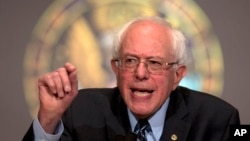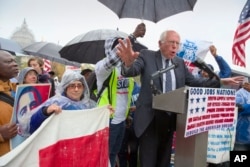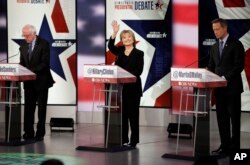Democratic presidential candidate Bernie Sanders on Thursday made the case for his "democratic socialist" economic policies, directly addressing the controversy over a label that some say makes him too liberal to be a legitimate presidential contender.
In a much-anticipated speech at Georgetown University in Washington, the Vermont senator defended his proposals to expand government welfare programs and raise taxes on the wealthy.
He said such policies should not be seen as radical, but as necessary to address what he called an unacceptable level of inequality.
"Despite major growth in our GDP and a huge increase in the global economy, tens of millions of American families continue today to lack the basic necessities of life while millions more struggle every day to provide a minimal standard of living for their families," Sanders told the crowd of mostly students.
Meets with Democrats
Sanders is an independent, not a member of either major U.S. political party, but he meets with lawmakers from the Democratic Party on policy issues.
His proposed economic policies include free tuition at public colleges, a government-run health-care system and doubling of the federal minimum wage, to $15 per hour.
Despite criticism that his proposals are too expensive and unrealistic, Sanders says there is a strong precedent in modern U.S. political history.
He cited the "New Deal" domestic relief programs enacted in the 1930s by President Franklin Delano Roosevelt.
"Roosevelt implemented a series of programs that put millions of Americans back to work, took them out of dire poverty and restored their faith in government," Sanders said.
"He redefined the relationship of the federal government to the people of our nation. He combated cynicism, fear and despair. He reinvigorated democracy, he transformed our country. And that is exactly what we have to do today," he added.
Although many of Roosevelt's programs were once seen as a "socialist" threat to the American way of life, Sanders said the Social Security pension system, the federal minimum wage and a 40-hour work week are no longer controversial, and seen instead as fundamental protections for members of the working class.
Stigmas attached to word
Sanders also addressed various stigmas commonly attached to the word "socialism," insisting he does not believe "in some foreign -ism."
"I don't believe the government should take over the grocery store down the street or take over the means of production," he said, drawing a clear distinction between his policies and the Marxist-Leninist brand of socialism commonly associated with one-party rule and state dominance of the economy.
Sanders, who is running second to ex-Secretary of State Hillary Clinton in most national public opinion polls, is seen as having only an outside chance at winning the Democratic nomination.
But, as evidenced by the supportive crowd Thursday, the 74-year-old is attracting considerable support from young people, many of whom have become disillusioned with the U.S. political process.
Recent polls have suggested younger Americans do not see the "socialist" label as objectionable.
Gallup poll
A Gallup poll earlier this year found that 69 percent of respondents in the 18-29 age bracket would have no problem voting for a "socialist" as president.
Older Americans, who generally turn out to vote more regularly than younger age groups, have been more skeptical. Only 47 percent of respondents of all ages saying they would vote for a socialist presidential candidate.














